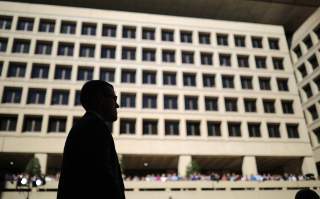Judge: Terrorist Watchlist Violates the Constitution
Did the courts just put an end to the terrorism database?
The judge ordered the Justice Department — which served as the defendant in this case — and the plaintiffs to submit arguments on how to properly implement the watchlist while still protecting peoples’ constitutional rights.
The Council on American-Islamic Relations scored a big court victory on Thursday, with a federal judge ruling that the FBI’s terror watchlist violates the Constitution.
Judge Anthony Trenga of the Eastern District of Virginia ruled in favor of 23 Muslim Americans who filed a lawsuit alleging that their inclusion on the Terrorist Screening Database violated their due process rights. Trenga, who was appointed by President George W. Bush in 2008, wrote in his 32-page opinion that the watchlist was too vague and infringed on the plaintiffs’ ability to fly and participate in other activities.
The federal judge also agreed with the plaintiffs that the process for putting individuals on the watchlist is done without proper methodology.
“An individual’s placement into the [watchlist] does not require any evidence that the person engaged in criminal activity, committed a crime, or will commit a crime in the future,” Trenga wrote. “The court concludes that the risk of erroneous deprivation of plaintiffs’ travel-related and reputational liberty interests is high, and the currently existing procedural safeguards are not sufficient to address that risk.”
The Terrorist Screening Database (TSDB) is not to be confused with the No Fly List, a different, more restrictive list that bars individuals from boarding airplanes. Nevertheless, people on the TSDB can be restricted from entering or leaving the U.S., result in tighter security screenings at airports, and could even get them denied benefits from the government.
Around 1.2 million people were included on the watchlist in 2017, according to the New York Times. However, most of the people on the list are foreign nationals who live outside the U.S., with only around 4,600 American citizens who are protected under the Constitution.
The Council on American-Islamic Relations (CAIR), which has referred to the watchlist as a “Muslim registry,” filed a lawsuit in 2016. The organization hailed the court decision as a “complete victory.”
“CAIR’s legal team has finally brought an end to the secretive watchlist, which is effectively a Muslim registry created in the wake of the widespread Islamophobia of the early 2000s,” CAIR’s executive director Nihad Awad said in a statement released Thursday.
While Trenga concluded at the current procedures in TSDB are insufficient to protect the rights of American citizens, changes to the watchlist’s mythology is yet to be determined.
The judge ordered the Justice Department — which served as the defendant in this case — and the plaintiffs to submit arguments on how to properly implement the watchlist while still protecting peoples’ constitutional rights.
Content created by The Daily Caller News Foundation is available without charge to any eligible news publisher that can provide a large audience. For licensing opportunities of our original content, please contact [email protected].
Image: Reuters.

